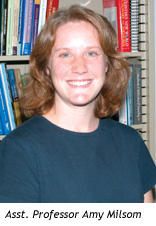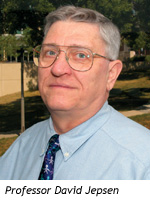|
Counseling
Rehabilitation & Student Development

School
Counselors Learn to Serve as Advocates
 If
School Counseling Assistant Professor Amy Milsom has her way,
school counselors across the country would be as involved
with students who have disabilities as they are with any other
students. If
School Counseling Assistant Professor Amy Milsom has her way,
school counselors across the country would be as involved
with students who have disabilities as they are with any other
students.
Unfortunately,
her research has shown that this is not the case. "School
counselors often lack the knowledge to effectively advocate
for and be proactive in meeting the needs of students with
disabilities," she said.
In
her current research and course curricula, Milsom is trying
to rectify that lack of knowledge and training. So, for instance,
in the fieldwork she supervises, she insists that her students
sit in on a special education class, attend an Individual
Educational Program meeting, and provide counseling to a student
with a disability.
Last
year, Milsom conducted a survey of all school counselor education
programs in the country to determine whether they require
specific training related to students with disabilities. She
found that virtually all programs integrated disability content
such as information about characteristics of students with
disabilities and disability legislation into existing course
curricula. Only 43 percent of the programs, however, required
their students to complete a freestanding course that focused
specifically on students with disabilities.
Not
surprisingly, Milsom also found significant differences in
the "integrated curriculum" vs. "separate course"
approaches. Special education courses were more likely to
include information about the specific characteristics and
development needs of students with disabilities. In addition,
special education courses were more likely to discuss the
federally mandated transition plans for special education
students who are on the threshold of high school.
School
counselors possess a vital array of tools that can help students
with disabilities reach their full potential. But, Milsom
says, too often school counselors do not know the specific
needs of students with disabilities or how to best address
those needs. With more coursework and experience during graduate
training, school counselors can obtain the disability knowledge
to prepare them as effective professionals.
"My
hope," she says, "is that Iowa graduates won't shy
away from working with students with disabilities. Rather,
I hope they will serve as advocates for these students, so
they receive the services they deserve and have opportunities
to reach their full potential." -by Jean Florman

 Work
Values Influence Career Choice Work
Values Influence Career Choice
Last
spring, 30 years after he first surveyed rural Iowa high school
students about their work values, School Counseling Professor
David Jepsen returned to small-town schools to find out whether
students' ideas had changed. The professor of counselor education
visited Tipton, Lone Tree, and Durant to find out what work
values high school seniors use as criteria for making decisions
about their future careers, education, and training.
Jepsen
administered questionnaires that explored what students value
in terms of career choices. After the responses were analyzed,
Jepsen returned to the schools and helped the students use
the information to better understand their values and potential
career choices.
"We
talked about how they combine family and work values and how
they can capitalize on these to make informed decisions,"
Jepsen says. "And I emphasized that their first choices
about career or work probably will change through time. They
need to be open to change because through their lives they
are likely to change jobs, employers, and even occupations."
Students
mentioned that they were influenced by three work values in
particular. First, they want to work in an occupation whose
tasks they find intrinsically interesting. Second, many of
them want to work in a "helping" occupation where
they can improve the welfare of someone else. And finally,
most hope to work in a field where they can achieve something
important.
Although
Jepsen has not completed his comparison between the 1973 and
2003 questionnaires, he suspects that students' work values
won't have changed too much. Other research, however, has
shown that young people who have been in the workforce for
a few years do, in fact, change their work values rather significantly.
"By
the time these young people are 25 years old," Jepsen
says, "the two work values influencing them most will
be income and working conditions."
One of Jepsen's former students, Denise Townsend (MA '00)
is the school counselor at Lone Tree High School and served
as the study's contact person in that school. Jepsen, who
grew up in rural Butler County, says he returned from his
visits "refreshed and energized."
"The
kids were just great," he says, "and they let us
know that they also gained useful information from our interaction."
-by Jean Florman

|